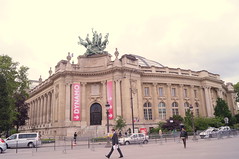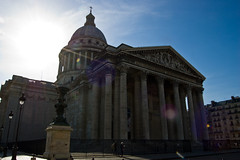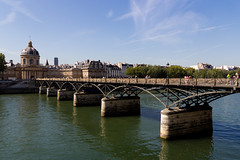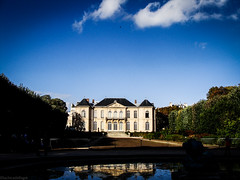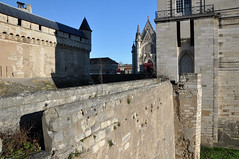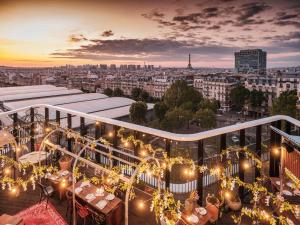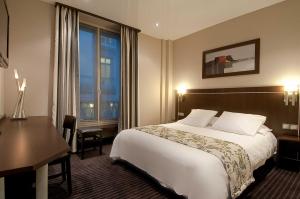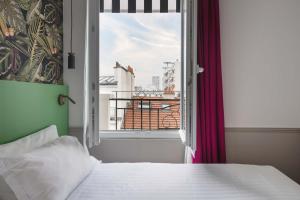Paris
Paris (English: /ˈpɪs/; French: [paʁi])is the capital and most populous city of France, with an official estimated population of 2,102,650 residents as of 1 January 2023 in an area of more than 105 km² (41 sq mi), making it the fourth-most populated city in the European Union as well as the 30th most densely populated city in the world in 2022. Since the 17th century, Paris has been one of the world's major centres of finance, diplomacy, commerce, fashion, gastronomy, and science. For its leading role in the arts and sciences, as well as its early and extensive system of street lighting, in the 19th century, it became known as "the City of Light". Like London, prior to the Second World War, it was also sometimes called the capital of the world.
The City of Paris is the centre of the Île-de-France region, or Paris Region, with an official estimated population of 12.271.794 habitants on January 1, 2023, or about 19% of the population of France, making the region France's primate city. The Paris Region had a GDP of €739 billion ($743 billion) in 2019, the highest in Europe. According to the Economist Intelligence Unit Worldwide Cost of Living Survey, in 2022, Paris was the city with the ninth-highest cost of living in the world.
Paris is a major railway, highway, and air-transport hub served by two international airports: Charles de Gaulle Airport (the second-busiest airport in Europe) and Orly Airport. Opened in 1900, the city's subway system, the Paris Métro, serves 5.23 million passengers daily; it is the second-busiest metro system in Europe after the Moscow Metro. Gare du Nord is the 24th-busiest railway station in the world and the busiest outside Japan, with 262 million passengers in 2015. Paris is especially known for its museums and architectural landmarks: the Louvre received 7.8 million visitors in 2022, keeping its position as the most-visited art museum in the world. The Musée d'Orsay, Musée Marmottan Monet and Musée de l'Orangerie are noted for their collections of French Impressionist art. The Pompidou Centre Musée National d'Art Moderne has the largest collection of modern and contemporary art in Europe and Musée Rodin and Musée Picasso. The historical district along the Seine in the city centre has been classified as a UNESCO World Heritage Site since 1991; popular landmarks there include the Cathedral of Notre Dame de Paris on the Île de la Cité, now closed for renovation after the 15 April 2019 fire. Other popular tourist sites include the Gothic royal chapel of Sainte-Chapelle, also on the Île de la Cité; the Eiffel Tower, constructed for the Paris Universal Exposition of 1889; the Grand Palais and Petit Palais, built for the Paris Universal Exposition of 1900; the Arc de Triomphe on the Champs-Élysées, and the hill of Montmartre with its artistic history and its Basilica of Sacré-Coeur.
Paris hosts several United Nations organisations including UNESCO, and other international organisations such as the OECD, the OECD Development Centre, the International Bureau of Weights and Measures, the International Energy Agency, the International Federation for Human Rights, along with European bodies such as the European Space Agency, the European Banking Authority or the European Securities and Markets Authority.
The football club Paris Saint-Germain and the rugby union club Stade Français are based in Paris. The 80,000-seat Stade de France, built for the 1998 FIFA World Cup, is located just north of Paris in the neighbouring commune of Saint-Denis. Paris hosts the annual French Open Grand Slam tennis tournament on the red clay of Roland Garros. The city hosted the Olympic Games in 1900, 1924 and will host the 2024 Summer Olympics. The 1938 and 1998 FIFA World Cups, the 2007 Rugby World Cup, as well as the 1960, 1984 and 2016 UEFA European Championships were also held in the city. Every July, the Tour de France bicycle race finishes on the Avenue des Champs-Élysées in Paris.
Etymology
The ancient oppidum that corresponds to the modern city of Paris was first mentioned in the mid-1st century BC by Julius Caesar as Luteciam Parisiorum ('Lutetia of the Parisii'), and is later attested as Parision in the 5th century AD, then as Paris in 1265. During the Roman period, it was commonly known as or in Latin, and as Leukotekía in Greek, which is interpreted as either stemming from the Celtic root *lukot- ('mouse'), or from *luto- ('marsh, swamp'), depending on whether the Latin or Greek form is the closest to the original Gaulish name.
The name Paris is derived from its early inhabitants, the Parisii (Gaulish: Parisioi), a Gallic tribe from the Iron Age and the Roman period. The meaning of the Gaulish ethnonym remains debated. According to Xavier Delamarre, it may derive from the Celtic root pario- ('cauldron'). Alfred Holder interpreted the name as 'the makers' or 'the commanders', by comparing it to the Welsh peryff ('lord, commander'), both possibly descending from a Proto-Celtic form reconstructed as *kwar-is-io-. Alternatively, Pierre-Yves Lambert proposed to translate Parisii as the 'spear people', by connecting the first element to the Old Irish carr ('spear'), derived from an earlier *kwar-sā. In any case, the city's name is not related to the Paris of Greek mythology.
Paris is often referred to as the 'City of Light' (La Ville Lumière), both because of its leading role during the Age of Enlightenment and more literally because Paris was one of the first large European cities to use gas street lighting on a grand scale on its boulevards and monuments. Gas lights were installed on the Place du Carrousel, Rue de Rivoli and Place Vendome in 1829. By 1857, the Grand boulevards were lit. By the 1860s, the boulevards and streets of Paris were illuminated by 56,000 gas lamps. Since the late 19th century, the city is sometimes called by the slang term Panam(e) (French: [panam]), due to the Panama hats popularly worn in the capital in the early 20th century..
Inhabitants are known in English as "Parisians" and in French as Parisiens (French: [paʁizjɛ̃]). They are also pejoratively called Parigots (French: [paʁiɡo]).
History
Origins
The Parisii, a sub-tribe of the Celtic Senones, inhabited the Paris area from around the middle of the 3rd century BC. One of the area's major north–south trade routes crossed the Seine on the île de la Cité; this meeting place of land and water trade routes gradually became an important trading centre. The Parisii traded with many river towns (some as far away as the Iberian Peninsula) and minted their own coins for that purpose.
The Romans conquered the Paris Basin in 52 BC and began their settlement on Paris's Left Bank. The Roman town was originally called Lutetia (more fully, Lutetia Parisiorum, "Lutetia of the Parisii", modern French Lutèce). It became a prosperous city with a forum, baths, temples, theatres, and an amphitheatre.
By the end of the Western Roman Empire, the town was known as Parisius, a Latin name that would later become Paris in French. Christianity was introduced in the middle of the 3rd century AD by Saint Denis, the first Bishop of Paris: according to legend, when he refused to renounce his faith before the Roman occupiers, he was beheaded on the hill which became known as Mons Martyrum (Latin "Hill of Martyrs"), later "Montmartre", from where he walked headless to the north of the city; the place where he fell and was buried became an important religious shrine, the Basilica of Saint-Denis, and many French kings are buried there.
Clovis the Frank, the first king of the Merovingian dynasty, made the city his capital from 508. As the Frankish domination of Gaul began, there was a gradual immigration by the Franks to Paris and the Parisian Francien dialects were born. Fortification of the Île de la Cité failed to avert sacking by Vikings in 845, but Paris's strategic importance—with its bridges preventing ships from passing—was established by successful defence in the Siege of Paris (885–886), for which the then Count of Paris (comte de Paris), Odo of France, was elected king of West Francia. From the Capetian dynasty that began with the 987 election of Hugh Capet, Count of Paris and Duke of the Franks (duc des Francs), as king of a unified West Francia, Paris gradually became the largest and most prosperous city in France.
High and Late Middle Ages to Louis XIV
By the end of the 12th century, Paris had become the political, economic, religious, and cultural capital of France. The Palais de la Cité, the royal residence, was located at the western end of the Île de la Cité. In 1163, during the reign of Louis VII, Maurice de Sully, bishop of Paris, undertook the construction of the Notre Dame Cathedral at its eastern extremity.
After the marshland between the river Seine and its slower 'dead arm' to its north was filled in from around the 10th century, Paris's cultural centre began to move to the Right Bank. In 1137, a new city marketplace (today's Les Halles) replaced the two smaller ones on the Île de la Cité and Place de Grève (Place de l'Hôtel de Ville). The latter location housed the headquarters of Paris's river trade corporation, an organisation that later became, unofficially (although formally in later years), Paris's first municipal government.
In the late 12th century, Philip Augustus extended the Louvre fortress to defend the city against river invasions from the west, gave the city its first walls between 1190 and 1215, rebuilt its bridges to either side of its central island, and paved its main thoroughfares. In 1190, he transformed Paris's former cathedral school into a student-teacher corporation that would become the University of Paris and would draw students from all of Europe.
With 200,000 inhabitants in 1328, Paris, then already the capital of France, was the most populous city of Europe. By comparison, London in 1300 had 80,000 inhabitants.
By the early fourteenth century, so much filth had collected inside urban Europe that French and Italian cities w…
Hotels Paris
Looking for places related to Paris?
Those are other destinations to find places related to Paris:






